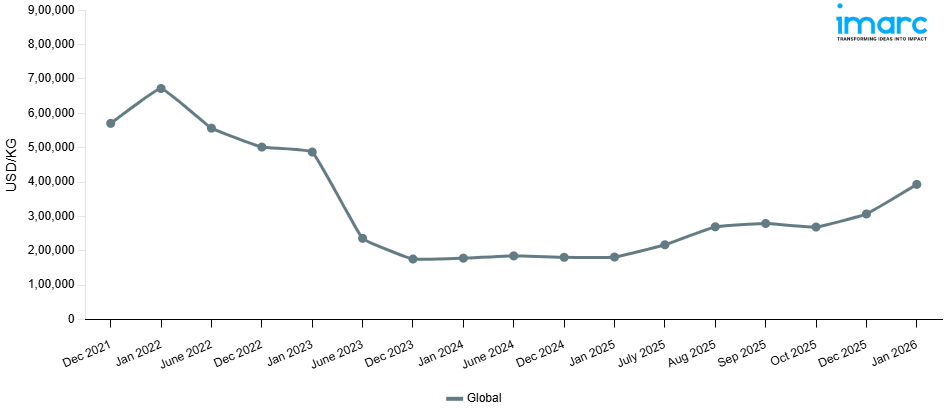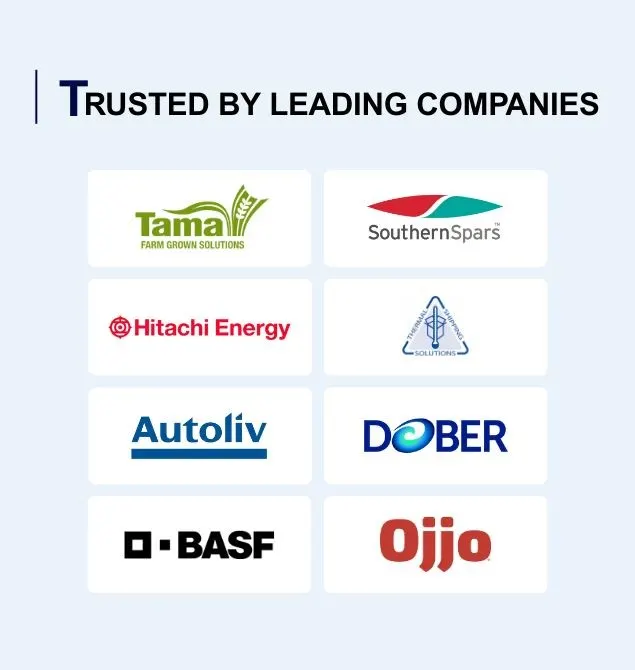
Rhodium Prices, Trend, Chart, Demand, Market Analysis, News, Historical and Forecast Data Report 2026 Edition
Rhodium Price Trend, Index and Forecast
Track real-time and historical rhodium prices across global regions. Updated monthly with market insights, drivers, and forecasts.
Rhodium Prices January 2026
| Region | Price (USD/Kg) | Latest Movement |
|---|---|---|
| Global | 393,206.34 | 28.0% ↑ Up |
Rhodium Price Index (USD/KG):
The chart below highlights monthly rhodium prices across different regions.

Get Access to Monthly/Quarterly/Yearly Prices, Request Sample
Market Overview Q3 Ending September 2025
Global: The market experienced an upward pricing movement, driven by a combination of constrained supply and resilient industrial demand, particularly from the automotive sector where rhodium is essential for emission control systems. Limited mine output and tight inventories sustained a bullish sentiment, while speculative interest further fueled upward momentum. Environmental regulations globally also played a role in sustaining demand for rhodium in catalytic converters, reinforcing the price increase. The price uptick reflects these intertwined supply and demand dynamics, underlining the market’s susceptibility to even minor disruptions.
Rhodium Price Trend, Market Analysis, and News
IMARC's latest publication, “Rhodium Prices, Trend, Chart, Demand, Market Analysis, News, Historical and Forecast Data Report 2026 Edition,” presents a detailed examination of the rhodium market, providing insights into both global and regional trends that are shaping prices. This report delves into the spot price of rhodium at major ports and analyzes the composition of prices, including FOB and CIF terms. It also presents detailed rhodium prices trend analysis by region, covering North America, Europe, Asia Pacific, Latin America, and Middle East and Africa. The factors affecting rhodium pricing, such as the dynamics of supply and demand, geopolitical influences, and sector-specific developments, are thoroughly explored. This comprehensive report helps stakeholders stay informed with the latest market news, regulatory updates, and technological progress, facilitating informed strategic decision-making and forecasting.
Rhodium Industry Analysis
The global rhodium industry size reached 23.57 Tons in 2025. By 2034, IMARC Group expects the market to reach 33.5 Tons, at a projected CAGR of 3.80% during 2026-2034. The rhodium market is driven by strong demand from the automotive industry for emission control applications, supported by tightening environmental regulations and expanding vehicle production. Additionally, its use in electronics, chemicals, and other high-performance applications reinforces its importance amid constrained global supply.
Latest developments in the Rhodium Industry:
- April 2025: Colombian authorities announced the discovery of rhodium deposits in the Department of Chocó, marking an important development in regional resource exploration. Although the quantities identified were modest, the find signals potential for future artisanal or industrial extraction and may attract mining investment interest in Colombia’s precious metals sector.
- July 2023: Reade International Corp., a supplier of high-grade specialty materials, announced the addition of AM TZM Powder to their Additive Manufacturing Powder product line.
- February 2023: US materials technology company American Elements launched AE Fusion Energy following the addition of new production facilities for the manufacture of advanced materials required in both R&D and scaled production for their range of fusion energy partner customers.
Product Description
Rhodium is a rare and highly valuable precious metal, primarily used in the automotive industry as a critical component of catalytic converters for reducing harmful emissions. The metal is prized for its catalytic properties, used widely in the automotive industry for catalytic converters (to help reduce toxic gases from an engine's exhaust), where its weight-to-price benefits outweigh environmental concerns. Apart from automotive purposes for rhodium, it is used within the chemical sector as a catalyst in techniques inclusive of the production of nitric acid. It is also used in jewelry, where it is applied to white gold and silver jewelry to improve the look and durability. Moreover, the infrequency of rhodium in the Earth's crust, as well as the use of the metal in a variety of industrial processes results in a high market value and correspondingly useful price swings.
Report Coverage
| Key Attributes | Details |
|---|---|
| Product Name | Rhodium |
| Report Features | Exploration of Historical Trends and Market Outlook, Industry Demand, Industry Supply, Gap Analysis, Challenges, Rhodium Price Analysis, and Segment-Wise Assessment. |
| Currency/Units | US$ (Data can also be provided in local currency) or Metric Tons |
| Region/Countries Covered | The current coverage includes analysis at the global and regional levels only. Based on your requirements, we can also customize the report and provide specific information for the following countries: Asia Pacific: China, India, Indonesia, Pakistan, Bangladesh, Japan, Philippines, Vietnam, Thailand, South Korea, Malaysia, Nepal, Taiwan, Sri Lanka, Hongkong, Singapore, Australia, and New Zealand* Europe: Germany, France, United Kingdom, Italy, Spain, Russia, Turkey, Netherlands, Poland, Sweden, Belgium, Austria, Ireland, Switzerland, Norway, Denmark, Romania, Finland, Czech Republic, Portugal and Greece* North America: United States and Canada Latin America: Brazil, Mexico, Argentina, Columbia, Chile, Ecuador, and Peru* Middle East & Africa: Saudi Arabia, UAE, Israel, Iran, South Africa, Nigeria, Oman, Kuwait, Qatar, Iraq, Egypt, Algeria, and Morocco* *The list of countries presented is not exhaustive. Information on additional countries can be provided if required by the client. |
| Information Covered for Key Suppliers |
|
| Customization Scope | The report can be customized as per the requirements of the customer |
| Report Price and Purchase Option |
Plan A: Monthly Updates - Annual Subscription
Plan B: Quarterly Updates - Annual Subscription
Plan C: Biannually Updates - Annual Subscription
|
| Post-Sale Analyst Support | 360-degree analyst support after report delivery |
| Delivery Format | PDF and Excel through email (We can also provide the editable version of the report in PPT/Word format on special request) |
Key Benefits for Stakeholders:
- IMARC’s report presents a detailed analysis of rhodium pricing, covering global and regional trends, spot prices at key ports, and a breakdown of ex-works, FOB, and CIF prices.
- The study examines factors affecting rhodium price trend, including supply-demand shifts and geopolitical impacts, offering insights for informed decision-making.
- The competitive landscape review equips stakeholders with crucial insights into the latest market news, regulatory changes, and technological advancements, ensuring a well-rounded, strategic overview for forecasting and planning.
- IMARC offers various subscription options, including monthly, quarterly, and biannual updates, allowing clients to stay informed with the latest market trends, ongoing developments, and comprehensive market insights. The rhodium price charts ensure our clients remain at the forefront of the industry.
Key Questions Answered in This Report
The rhodium price in January 2026 was 393,206.34 USD/KG globally.
The rhodium pricing data is updated on a monthly basis.
We provide the pricing data primarily in the form of an Excel sheet and a PDF.
Yes, our report includes a forecast for rhodium prices.
The regions covered include North America, Europe, Asia Pacific, Middle East, and Latin America. Countries can be customized based on the request (additional charges may be applicable).
Yes, we provide both FOB and CIF prices in our report.
Need more help?
- Speak to our experienced analysts for insights on the current market scenarios.
- Include additional segments and countries to customize the report as per your requirement.
- Gain an unparalleled competitive advantage in your domain by understanding how to utilize the report and positively impacting your operations and revenue.
- For further assistance, please connect with our analysts.
Why Choose Us
IMARC offers trustworthy, data-centric insights into commodity pricing and evolving market trends, enabling businesses to make well-informed decisions in areas such as procurement, strategic planning, and investments. With in-depth knowledge spanning more than 1000 commodities and a vast global presence in over 150 countries, we provide tailored, actionable intelligence designed to meet the specific needs of diverse industries and markets.
1000
+Commodities
150
+Countries Covered
3000
+Clients
20
+Industry
Robust Methodologies & Extensive Resources
IMARC delivers precise commodity pricing insights using proven methodologies and a wealth of data to support strategic decision-making.
Subscription-Based Databases
Our extensive databases provide detailed commodity pricing, import-export trade statistics, and shipment-level tracking for comprehensive market analysis.
Primary Research-Driven Insights
Through direct supplier surveys and expert interviews, we gather real-time market data to enhance pricing accuracy and trend forecasting.
Extensive Secondary Research
We analyze industry reports, trade publications, and market studies to offer tailored intelligence and actionable commodity market insights.
Trusted by 3000+ industry leaders worldwide to drive data-backed decisions. From global manufacturers to government agencies, our clients rely on us for accurate pricing, deep market intelligence, and forward-looking insights.
 Request Customization
Request Customization
 Inquire Before Buying
Inquire Before Buying
 Speak to an Analyst
Speak to an Analyst Request Brochure
Request Brochure




.webp)




.webp)












